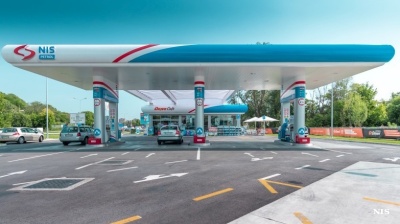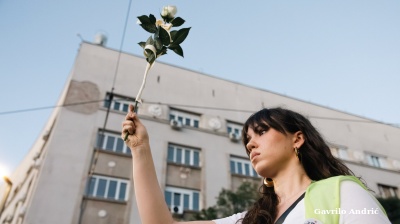Tensions flared outside Serbia’s parliament on November 2 after police blocked Dijana Hrka, the mother of a victim of last year’s Novi Sad railway station collapse, from beginning a hunger strike, prompting crowds to gather in her support.
Hrka, whose son Stefan was among 16 people killed when a train station roof collapsed on November 1, 2024, began her hunger strike in front of the National Assembly, demanding that President Aleksandar Vucic meet three conditions related to accountability for the tragedy.
As night fell, anti-government protesters faced off with supporters of Vucic’s ruling Serbian Progressive Party (SNS), who are camped nearby in an area known as “Ćaciland”. Witnesses reported cannon shots, fireworks and bottles being thrown between the groups, while police formed a cordon to keep them apart.
Videos shared on social media showed pyrotechnics fired toward the area where Hrka and journalists were gathered. Supporters accused pro-government groups of launching the attacks, though police did not immediately respond to the incidents.
The confrontation took place following a massive public demonstration against the government. On November 1, over 100,000 people gathered in Novi Sad to mark one year since the canopy collapse, according to the Archive of Public Gatherings, which described it as the biggest event in the city’s history. The disaster, which killed 16 and injured one, has become a rallying point for anger over corruption and government negligence.
The turnout underscored the persistence of Serbia’s protest movement, which has united students, civic groups and citizens demanding greater accountability and reform.
President Vucic appeared to strike a conciliatory tone earlier on November 2, saying he was open to holding elections ahead of schedule but did not specify a date. “We will meet the demands of the blockaders... elections will be held before the deadline,” Vucic told reporters while touring construction of the new national stadium in Belgrade.
Student organisers, however, dismissed the remarks as insincere. Late on November 2, they urged citizens to leave the streets of central Belgrade as tensions rose. “We are asking everyone to get off the streets to safety,” they said in a social media post that was later deleted.
By evening, police maintained a heavy presence around parliament as rival groups exchanged slogans against each other and the government.
News

Northern Afghanistan hit by M6.3 tremor
A powerful earthquake has struck northern Afghanistan, leaving at least four people dead and scores injured, according to local officials. The numbers are expected to rise significantly.

Kerala becomes India’s first state to declare freedom from extreme poverty
The state's Chief Minister described the moment as the dawn of a new era for Kerala, attributing the achievement to a sustained four-year effort under the Extreme Poverty Alleviation Project.

Russia launches Khabarovsk nuclear submarine designed to deploy nuclear-capable Poseidon drones
Russia has launched a new strategic nuclear submarine, the Khabarovsk, which is capable of carrying a dozen of the Kremlin’s recently unveiled nuclear-powered Poseidon torpedo—a next-generation weapons system that Putin called "unstoppable."

Pashinyan urges end to ‘Soviet KGB worldview’ in Armenian-Azerbaijani relations
In an animated speech, Armenian Prime Minister Nikol Pashinyan called for a fundamental reset in the way Armenians and Azerbaijanis perceive one another, urging both nations to move beyond Cold War-era "KGB" mentalities are stil at play.




